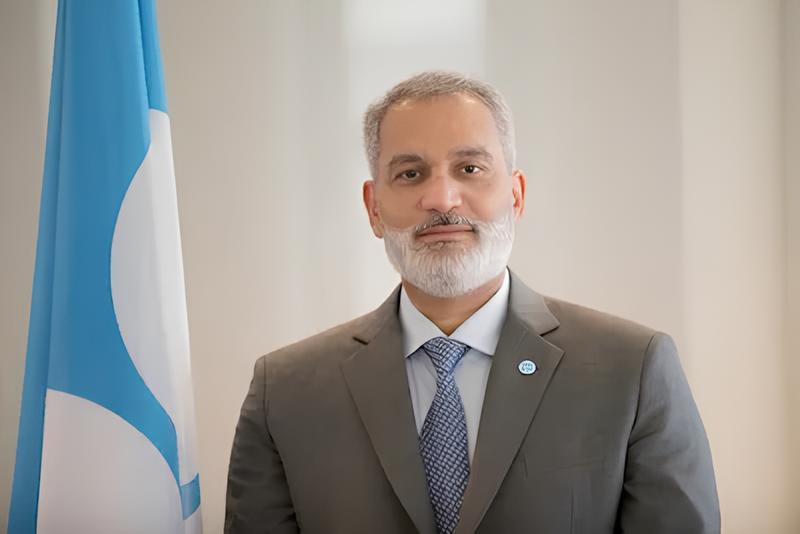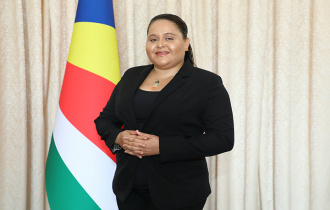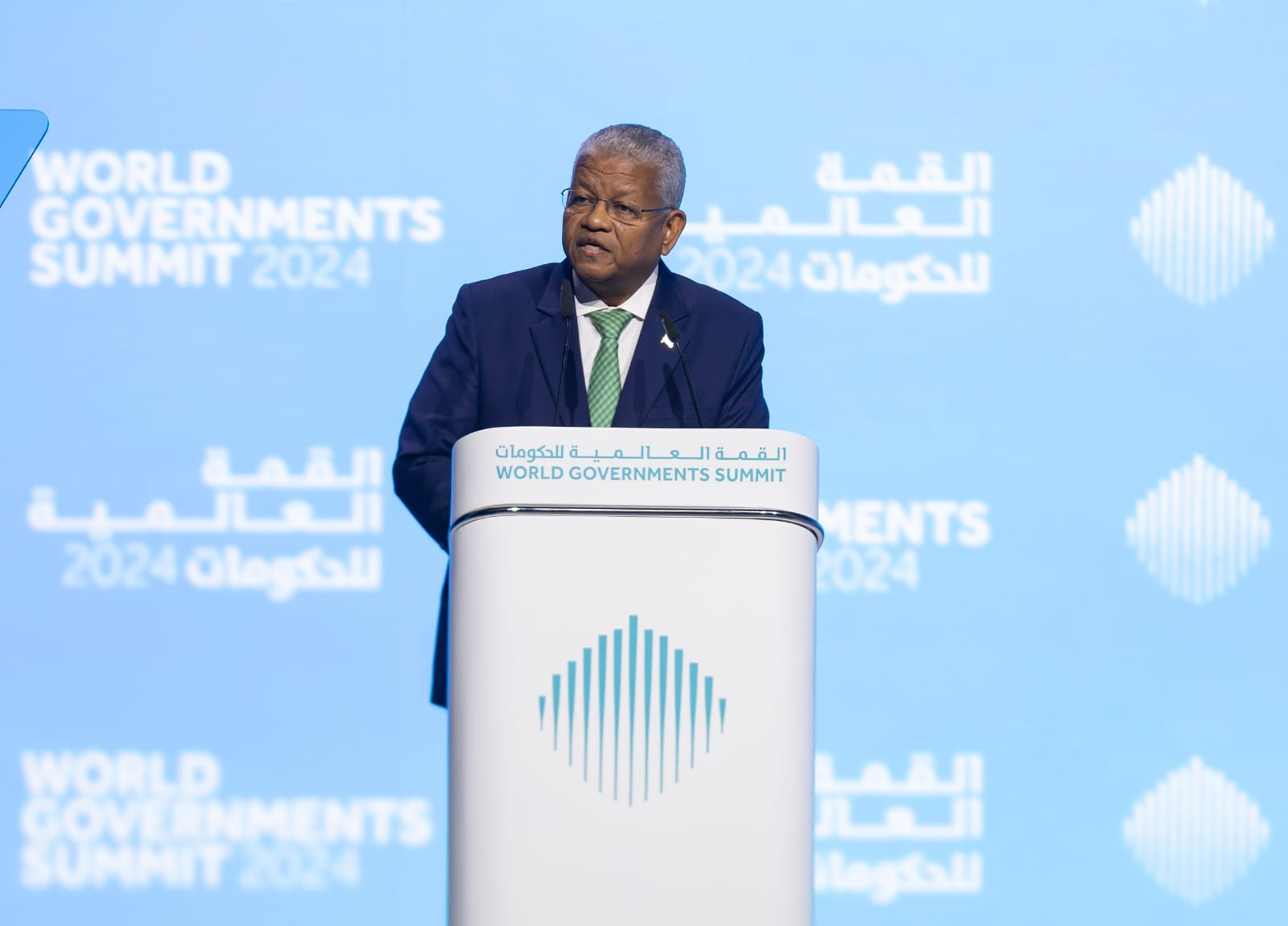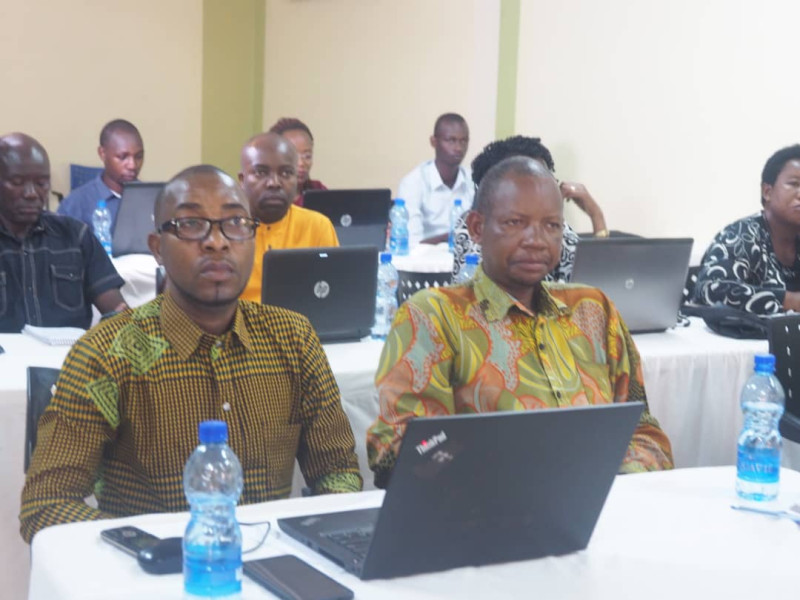ABIDJAN, Ivory Coast, March 8, 2024/ — President of the African Development Bank Group (www.AfDB.org) Dr. Akinwumi Adesina has appealed to leaders in Nigeria and across Africa to make poverty history as he outlined a compelling case for welfarist policies and people-centred development.
“Given the high levels of poverty in Africa, and Nigeria, what is needed are welfarist policies that exponentially expand opportunities for all, reduce inequalities, improve the quality of life of people,” Adesina said as he received the prestigious Awolowo prize for leadership at a colourful ceremony in Lagos on Wednesday.
Africa’s present and former presidents were among hundreds of guests who attended the award ceremony where Adesina delivered the Awolowo Foundation’s annual lecture on ‘Making a New Nigeria: Welfarist Policies and People-Centred Development.’
Among visiting Presidents were Azali Assoumani of the Union of the Comoros; Samia Suluhu Hassan of the United Republic of Tanzania and Sahle-Work Zewde of the Federal Democratic Republic of Ethiopia. The Prime Minister of Togo Victoire Tomegah Dogbe represented her country’s President Faure Gnassingbe.
Leaders from across Nigeria included Vice President Kashim Shettima who represented President Bola Tinubu, former Presidents Goodluck Ebele Jonathan, Olusegun Obasanjo and Yakubu Gowon and Ghana’s former president John Dramani Mahama. Also attending were 19 State Governors and royal fathers including the Emir of Bichi Alhaji Nasiru Ado Bayero, the Obi of Onitsha Igwe Nnaemeka Alfred Achebe, the Ooni of Ife Oba Adeyeye Enitan Ogunwusi, the Olu of Warri Ogiame Atuwatse III and the Igwe of Orlu Dr. Patrick Acholonu.
The event was moderated by Dr. Victor Oladokun, Senior Advisor for Communication and Stakeholder Relations to the President of the African Development Bank.
In his lecture, Adesina identified five critical areas that Nigerian and African leaders need to focus on to transform their economies and people’s lives: The transformation of the rural economy and food security, health security for all, education for all, affordable housing for all and government accountability and fiscal decentralisation for a true federalism.
Transforming rural economies, ensure food security for all
Adesina said a better Africa must start with transforming rural economies, “that is because some 70% of the population lives there. Rural poverty is extremely high. At the heart of transforming rural economies is agriculture, the main source of livelihoods.”
“When rural economies falter, nations falter,” Adesina warned, “this leads to the spread of anarchy and terrorists who take advantage of the economic misery to entrench themselves.”
He highlighted how the African Development Bank Group is supporting a farm revolution at scale across the continent. “We have invested over $8.5 billion in agriculture in the past seven years which has impacted 250 million people.”
“The African Development Bank and development partners are providing $1.4 billion for the development of 25 Special Agro-Industrial Processing Zones in eleven countries,” he said.
In Nigeria alone, the Bank is developing these zones in eight of the country’s 36 states with $518 million. Another $1 billion will go into the second phase of the program which will cover 23 more states.
Health care for all
“Nigeria needs health care for all,” said Adesina, “smart governments provide universal basic health coverage for their citizens.”
He spoke about how sicknesses and diseases cost Africa $2.6 trillion in lost productivity.
Adesina also recounted how the Covid-19 pandemic caught Africa unprepared, unprotected and left at the bottom of the ladder when it came to the distribution of vaccines.
He explained the various initiatives the Bank Group introduced to address Africa’s health needs including a $10 billion facility to support countries to cope with the pandemic; a $3 billion program to revamp Africa’s pharmaceutical industries and the recent launch of the African Pharmaceutical Technology Foundation to support access to proprietary technologies from global pharmaceutical companies.
Calling on Nigeria to secure the health of all its population, Adesina said, “This will require ensuring that no citizen travels more than a few kilometers to find a health care center. The widespread use of mobile health centers, e-health facilities, the digitalization of health systems, especially in all primary health care centers, health insurance policies for all, including innovative micro-health insurance pay-as-you-go systems, will capture the bulk of the population that is in the informal sector.”
Education for all
Adesina wants Nigeria to provide education for all. According to the United Nations Children’s Education Fund (UNICEF), Nigeria accounts for 15% of the total population of out-of-school children which includes over 10.2 million at the primary school level and 8.1 million at the Junior Secondary School.
“This is not a gold medal Nigeria should be proud of wearing,” he said and expressed concern about “the poor funding of universities, lack of basic infrastructure, poor incentives for lecturers and incessant strikes due to wage disputes, have almost crippled the university system.”
Adesina gave an example of the Bank Group’s investment of $614 million in Nigeria’s IDICE program to support the development of digital and creative enterprises. The program is expected to create 6.3 million jobs and add an estimated $6.4 billion to the economy of Nigeria.
Housing for all
Adesina told guests that welfarist policies are urgently needed to ensure all Nigerians have access to basic and affordable housing. He noted that according to data by the UN Habitat, 49 percent of Nigeria’s population which is equivalent to 102 million people, live in slums.
He said what people need is decent housing and not upgrading of slums. “There is nothing like a 5-star slum. A slum is a slum.”
Government accountability and fiscal decentralisation for a true federalism
The Bank Group president said, “Citizen’s accountability forums are needed for the people to have a say in how their nation’s resources are being used and how their governments are performing.”
To enhance transparency and accountability of governments to the people, the African Development Bank is developing a public service delivery index, which will rate governments on the quality-of-service delivery for citizens.
“If people pay taxes, governments must deliver services,” said Adesina.
According to the African Development Bank’s recently published Africa’s Macroeconomic Performance and Outlook, Nigeria is currently experiencing slow growth. The end of the country’s fuel subsidy regime and measures to unify the exchange rate have contributed to rapidly rising living and import costs, which have weighed on domestic demand and production, as well as investment, leading to an economic slowdown.
“To get out of the economic quagmire, there is a compelling need for the restructuring of Nigeria. Restructuring should not be driven by political expediency, but economic and financial viability,” said Bank Group president.
He said for Nigeria to succeed with much needed welfarist and people-centered policies, it is necessary to change the governance system to decentralize greater autonomy to the states.
Saying it was time to pave way for a new Nigeria, Adesina said, “Instead of a Federal Government of Nigeria, we could think of the United States of Nigeria.”
The award which promotes the legacy and democratic ideals of the late Nigerian nationalist and federalist leader Chief Obafemi Awolowo, also “recognises and celebrates excellence in leadership.”
African leaders recognised the African Development Bank for its transformative impact on the continent under Adesina’s leadership.
Tanzanian President Samia Suluhu Hassan, who chaired the 2023 Obafemi Awolowo Prize for Leadership Award ceremony, described Adesina as a dynamic and visionary leader.
“He has a rare ability to turn vision into concrete transformational solutions that impact the lives of millions of people across Africa. Tanzania is one of many African states that have greatly benefited from his dynamic and astute leadership,” she said.
“Through his leadership and support, we have been able to raise $3.8 billion to support the construction of the regional standard gauge railway that will connect Tanzania to the Democratic Republic of Congo and the Republic of Burundi.”
President Azali Assoumani of the Comoros said, “Dr. Adesina has an incredible ability to bring leaders together to engage and commit to initiatives that are transforming Africa every day. A great visionary, innovative, and pragmatic, Dr. Adesina has masterfully led transformative initiatives at the African Development Bank.”
In a message read by Vice President Kashim Shettima, Nigeria’s President Asiwaju Bola Ahmed Tinubu said Adesina’s ability to navigate the complexities of his role at the African Development Bank demonstrates his competence and resilience in the face of challenges.
“Today, we gather to honour a man who has carved his path in one of the most challenging offices to lead—Dr. Akinwumi Adesina,” he added.
Ethiopia’s Sahle-Work Zewde highlighted how the African Development Bank has become a huge brand in her country and a long-standing, trusted partner of her country’s development.
“Since Dr. Adesina took the presidency of the bank, the African Development Bank has provided us with access to heat-tolerant wheat varieties. Ethiopia, despite the many challenges, has become a lead producer of wheat, leading to self-sufficiency in only four years,” she said.
“We need this hope and concrete action to showcase that Africa can become self-sufficient in food,” the Ethiopian president added.
Speaking on behalf of President Gnassingbe of Togo, the country’s Prime Minister Victoire Tomegah Dogbé pointed to the African Development Bank’s support to help farmers increase their yield. “With the support of the Bank, Togo has become an exporter of organic soybeans to Europe,” the Prime Minister said and praised Adesina for providing sound leadership that has transformed the Bank into a globally respected institution.
Adesina is the fourth recipient of the Award. Past winners include lawyer Afe Babalola, writer and Nobel Laureate Wole Soyinka, and former South African President Thabo Mbeki.
The Chairman of the Obafemi Awolowo Prize for Leadership Selection Committee, Chief Emeka Anyaoku said the Bank Group president was the unanimous choice of the Foundation’s Selection Committee among many other eminent nominees.
Many global figures sent congratulatory messages to Adesina for the award, including the President of the World Bank Group Ajay Banga, the Managing Director of the International Monetary Fund Kristalina Georgieva, former British Prime Minister Tony Blair; Chief Executive Officer of Agence Française de Développement Rémy Rioux; Chief Executive Officer of the Global Center on Adaptation Prof. Dr. Patrick Verkooijen, President Emeritus of the World Food Prize Foundation Ambassador Kenneth Quinn and the former UN Secretary-General Ban Ki-moon.
The Chairman of the Obafemi Awolowo Prize for Leadership Foundation, and former President of Nigeria Yakubu Gowon said Adesina’s “widely acclaimed achievements as Nigeria’s Minister of Agriculture and two terms as President of the African Development Bank attest to his desirability as the recipient of the 2023 Obafemi Awolowo Prize for Leadership”.
The Executive Director of the Obafemi Awolowo Foundation, Ambassador Dr. Tokunbo Awolowo-Dosumu, said Adesina, “possesses the attributes for the award to the highest degree”.
Distributed by APO Group on behalf of African Development Bank Group (AfDB).
D








